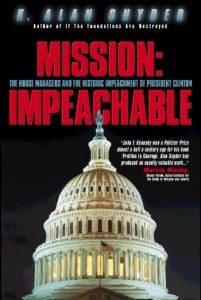I spoke last evening at the Winter Haven, Florida, 9/12 Project meeting. For those who are unfamiliar with the organization, it began after the 2008 elections with the expressed purpose of educating citizens on the kinds of principles and values that formed the bedrock of our nation and our government. This organization is performing a valuable public service, and I heartily endorse its goals. They are the same goals I have maintained throughout my twenty-two years of teaching at universities. We are an ignorant people, by and large, and it’s time we once again grasped the essence of the republic that was created over two hundred years ago.
 I had spoken to this 9/12 group two times previously. The first time I gave an overview of progressivism and how it has led us astray from constitutionalism; the second time was an examination of the principles that made Ronald Reagan’s presidency successful. Last night I focused on the Clinton impeachment of more than a decade ago, and what we should learn from that sad episode. Drawing from the book I wrote back in 2001, Mission: Impeachable–The House Managers and the Historic Impeachment of President Clinton, I concentrated on the reasons the House Managers gave for prosecuting the president at that time. In the face of public opinion polls that showed 67% of the electorate didn’t want Clinton removed from office, and in the teeth of a Republican-dominated Senate that had no stomach for this endeavor, these House Managers risked the wrath of both to make the case for removal.
I had spoken to this 9/12 group two times previously. The first time I gave an overview of progressivism and how it has led us astray from constitutionalism; the second time was an examination of the principles that made Ronald Reagan’s presidency successful. Last night I focused on the Clinton impeachment of more than a decade ago, and what we should learn from that sad episode. Drawing from the book I wrote back in 2001, Mission: Impeachable–The House Managers and the Historic Impeachment of President Clinton, I concentrated on the reasons the House Managers gave for prosecuting the president at that time. In the face of public opinion polls that showed 67% of the electorate didn’t want Clinton removed from office, and in the teeth of a Republican-dominated Senate that had no stomach for this endeavor, these House Managers risked the wrath of both to make the case for removal.
Why did they do it?
I interviewed all thirteen of those House Managers and found a fairly consistent rationale. They were concerned primarily about the importance of upholding the rule of law in our society. What does that mean? Simply that no one, not even a president, can set himself up as above the law. Everyone must be held accountable for their actions.
Intertwined with that concern were two others: constitutionality [the need for checks and balances in the government] and the character issue, given how Clinton disgraced the high office he held. Many of those congressmen I interviewed were up front with their Christian convictions, which provided the strength to go forward and do what was right even when the public opposed them.
My conclusion in the book is that the Managers acted on principle and deserve to be honored for their attempt. As one of them stated, we need to put principle above expediency, honor above incumbency. The application for our day, a decade later, is obvious.
I thank the 9/12 group for giving me the opportunity to share. I trust I helped fulfill the goals of the organization. May they continue to thrive and attract others to the cause.
